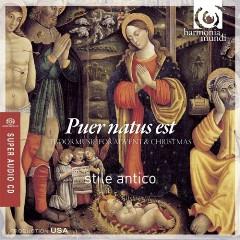Puer Natus Est - Tudor Music for Advent & Christmas (Stile Antico) [2010]
Puer Natus Est - Tudor Music for Advent & Christmas (Stile Antico) [2010]

1. Thomas Tallis - Videte miraculum 11:38 2. John Taverner - Audivi vocem de caelo 4:09 3. William Byrd - Rorate caeli desuper (from Gradualia 1) 4:41 Missa Puer natus est (‘A boy is born’) 4. Thomas Tallis - Gloria 9:27 5. William Byrd - Tollite portas (from Gradualia 1) 2:09 6. Thomas Tallis - Sanctus & Benedictus 8:54 7. William Byrd - Ave Maria (from Gradualia 1) 2:08 8. Thomas Tallis - Agnus Dei 8:22 9. William Byrd - Ecce virgo concipiet (from Gradualia 1) 2:15 10. Robert White - Magnificat 13:51 11. Gregorian Chant - Puer natus est 1:11 12. John Sheppard - Verbum Caro Factum Est, for 6 voices 9:16 Stile Antico (Vocal Ensemble)
The British vocal ensemble Stile Antico was established in 2001 and within its first decade has been acknowledged as one of the very finest early music groups, with multiple Grammy nominations, as well as Gramophone and Diapason d'or Awards. This album, Puer natus est: Tudor Music for Advent and Christmas, received a Diapason d'or Award in October 2010. One thing that sets this group apart from similar ensembles is the fact that it works without a conductor, making aesthetic decisions together and listening very, very closely to each for balance and tempos. It's possible to hear the singers' commitment to each other in their attentiveness to the subtlest nuances in dynamics and pacing. Their approach is ideal for this repertoire, English Renaissance polyphony, which demands intense concentration, absolutely secure intonation, and a carefully balanced blend to make its full impact. The centerpiece of the album is Thomas Tallis' incomplete Christmas mass, Missa Puer natus est, of which only three movements were written. The recording opens with Tallis' Advent motet, Videte miraculum, and includes four of William Byrd's settings of the Propers of the Mass, a Magnificat by Robert White, motets by John Tavener and John Sheppard, as well as the plainchant on which Tallis' mass is based. The mass movements are separated by the propers and motets, as would have been done in a liturgical setting. The gain in performance authenticity is tempered by the loss of continuity of hearing the mass as a complete unit. The flow of the selections is pleasant, but this ordering makes it hard to keep track of the unity of Tallis' work. Stile Antico sings with phenomenally pure tone. The women's voices have the chaste clarity associated with boys' voices, but deployed with a technical assurance and musical sensitivity beyond that of most boys. The sound of the ensemble is ravishing in its warmth and the evenness of its blend. The performances are expressive, but never idiosyncratically so; the singers have no interpretive agenda other than letting the composers' voices be heard as beautifully and authentically as possible. The sound of Harmonia Mundi's hybrid SACD is clear, absolutely clean, and suffused with warmth. ---Stephen Eddins, Rovi
This exquisite Advent/Christmas program is laid out in a more varied way than the prosaic headnote would suggest. The Tallis motet on the miraculous conception of the Savior and Taverner’s motet on the wise virgins (an Advent theme) lead off. Byrd’s Propers for the fourth Sunday in Advent are interleaved with the movements of Tallis’s Christmas Mass that gives the disc its title. The program ends with Robert White’s six-voice Magnificat and Sheppard’s Christmas motet. The chant introit that also gives the disc its title is added before the last piece. The beauty of the program comes from the way this English Tudor polyphony fits together so perfectly. Not least a demonstration of the program’s inventiveness is ending it with Sheppard’s seven-voice motet, matching the scoring of the Mass. Sheppard’s brilliant ending, dividing the trebles to produce an eight-voice chord on the last note, makes a perfect conclusion to the whole program.
The last time this Mass was reviewed here ( Fanfare 27:6), the parallel between the boy who was born in Bethlehem and the boy that Queen Mary devoutly (but erroneously) hoped to be bearing at Christmas 1554 was spelled out. Here the notes suggest that it would have been insensitive of Tallis to make the point, given the risk that the queen was not pregnant, that she might bear a girl, or that the child might not survive. Tallis’s Mass and motet are in the third and fourth discs of Alistair Dixon’s complete works of the composer, and the Byrd Propers are in the first disc of Andrew Carwood’s set of that composer, while the Sheppard anthem is in the first disc of Harry Christophers’ set of the composer. Robert White’s Magnificat is in Peter Phillips’s disc devoted to him. All of these surveys of Tudor composers have been lavishly praised, but the present ensemble brings a special sensitivity to the group of works heard in this context. The Sheppard piece is quite a bit broader than the earlier version. Singing two voices to a part, Stile Antico produces a light, floating tone usually associated with single-voice ensembles combined with the warmth of voices blending together. This group makes every new release a delight. Don’t let the duplication of repertoire deter you from hearing this program unfold in all its fascinating beauty. ---FANFARE: J. F. Weber, arkivmusic.com
download (mp3 @320 kbs):
yandex 4shared mega mediafire zalivalka cloudmailru uplea








